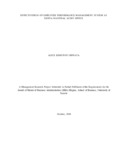| dc.description.abstract | The Government in its endeavour to transform the public sector from the culture of laxity, laziness and complacency to a business oriented culture, introduced employee performance management system as one of the Public Sector Reform's (PSRs) policies to improve service delivery, offer quality, effective, and efficient service to satisfy both internal and external customers and also achieve the National Vision 'Kenya Vision 2030'.
The objective of the study was to evaluate the effectiveness of employee performance management system at the Kenya National Audit Office. The study established that the Kenya National Audit Office has adopted the employee performance through government directive and International Financial Institutions need for quality reporting standards. The World Bank (WB) in particular needed reforms so as to meet the donor target demands through application of International Financial Reporting Standards (IFRS' s)
Primary data was collected through an interview which was conducted with the help of an interview guide. Ten senior managers in charge of performance management were interviewed and were able to express the strengths and weaknesses of employee performance management at Kenya National Audit Office.
The study revealed the strengths of employee performance such as production of timely reports due to commitment and dedication of staff and improved quality, efficient and effective service. The study also identified weak areas, where staff are resistant to change, and rewards and sanctions are ineffectively applied due to the long bureaucratic processes and regulations. There is need to clearly define the rewards so that staff work towards them and sanctions or disciplinary cases should take the shortest time possible.
The study recommends that the management shed off the bureaucratic tendencies and adopt best practices of rewarding. It is difficult to encourage employees to perform unless they know that their compensation is tied to performance. Rewards act as a motivating factor to excellent performance and staff feel sacrosanct in the organization they work for. | en_US |

